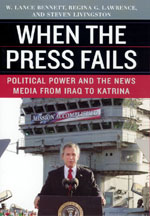Jim Boyd on When the Press Fails

Jim Boyd, the former deputy editorial page editor at the Star Tribune in Minneapolis has written an interesting piece on W. Lance Bennett, Regina G. Lawrence, and Steven Livingston’s When the Press Fails: Political Power and the News Media from Iraq to Katrina for the Spring 2008 issue of the Nieman Report. Using his own personal experiences to comment on the author’s claims that the American news media—especially during the Bush presidency—has become increasingly susceptible to White House spin Boyd writes:
It is the central thesis of When the Press Fails that the press has become excessively deferential to political power in Washington and has forfeited its (occasional) role as independent watchdog of government. The rule of the press road in Washington now is to run every story through the filter of political power and, unless another strong actor (say, Congress) raises a stink, the press will dutifully report whatever the administration says, without challenge. When you add into the mix an administration that admits to no requirement that it be truthful and straight—indeed, quite the reverse—we have the embarrassing story of press failure to challenge the deceitful case for war in Iraq.
But as Boyd points out, the press’s obeisance to governmental authority may be less a reaction to heavy-handed politicians, as to the major news media corporations’ focus on making profits:
The most pernicious influence is the fiduciary obligation that owners of our highly concentrated media believe they owe to shareholders.… As deputy editorial page editor at the Star Tribune in Minneapolis, I was the principal writer on Iraq for the newspaper’s editorial page. We broke with Bush on Iraq when he broke with the United Nations. We became increasingly strident and began to draw national attention and a national Web audience. We suffered for it; our corporate masters strongly disapproved of our behavior; they wanted us flying well under the radar screen.… Apparently the prevailing wisdom in corporate media boardrooms is that workers—even when they are journalists—don’t serve shareholders well by making waves. We make nice, which dovetails powerfully with the inclination to defer to power.
Navigate to the Nieman Foundation’s website to read the full article online.
Also read an excerpt from the book.